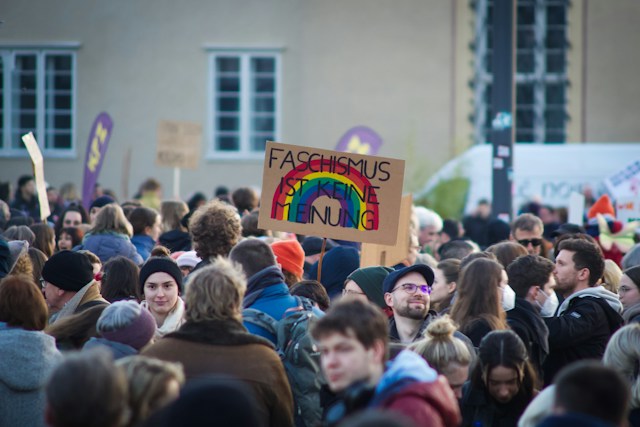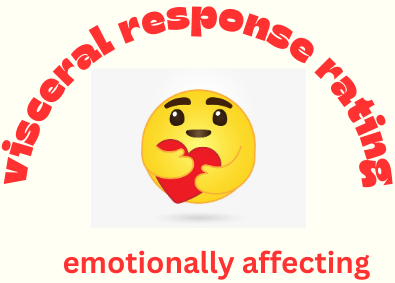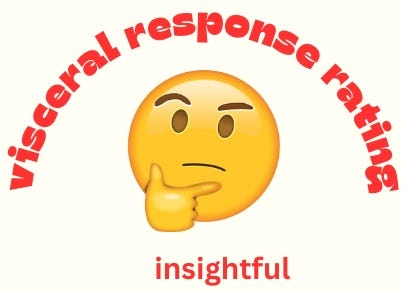Germans are protesting like it’s 1933

Here’s the full version of the Jan31 This Week, Those Books. Sign up for free at https://thisweekthosebooks.com/ and get the post the day it drops
Welcome to This Week, Those Books, your rundown on books new and old that resonate with the week’s big news story.
The few minutes it takes to read this newsletter will make you smarter, faster. Or click on the audio button above for a human, not AI, voiceover by my close collaborator Michael. These book suggestions come with a summary and quotes. So even if you don’t read the actual book, you’ll be able to discuss it. I never recommend a book I don’t like and I look through a number every week to find the few I share with you. Find me on Twitter, LinkedIn, Facebook or YouTube.
Book Lovers, Rejoice!
We’re celebrating This Week, Those Books’ six-month birthday with more than 6,800 subscribers in 98 countries. Grab your chance to own The Dictator’s Wife by Freya Berry, the very first book featured in the inaugural issue. Click here to comment by February 1 and your name will be entered in the competition to win the book. Hurry!
Yours,

The Big Story:
Germans are protesting the rise of the far right and there are plans for a significant rally in Berlin with a human chain around the Reichstag, seat of parliament. Some say there are grave and frightening echoes of 1933.
- That’s when Austrian-born Adolf Hitler took power in Germany, following election wins by his National Socialist German Workers’ (Nazi) Party. It was also when the Reichstag burned down in an arson attack, giving Hitler the excuse to suspend civil liberties and start a 12-year dictatorship.
- The current German protests – as well as spillover demonstrations in neighbouring Austria – are prompted by leaked news of a below-the-radar discussion between far right politicians and neo-Nazi activists on plans for the mass deportation of foreigners should they gain power. German citizens of foreign ethnicity would also be deported.
- That meeting was attended by members of the far right Alternative for Germany (AfD) party and the main opposition centre-right Christian Democratic Union, some German businesspeople and a leading Austrian extreme right ideologue.
- The AfD, which is against immigration and has called for the protection of “western Christian culture”, has been polling in second place nationally.
- It models itself on Austria’s far-right Freedom party (FPO), which is also polling strongly, ahead of Austrian elections later this year.
The Backstory:
- Some compare the modern far right’s mass deportation proposals to the Nazis’ initial plan to deport European Jews to Madagascar.
- Germany’s Interior Minister Nancy Faeser has pointed out that today’s far right discussed their mass deportation plan at a venue close to where the Nazis, exactly 82 years ago, coordinated the “Final Solution of the Jewish Question”, ie, the systematic murder of millions of European Jews.
- Defense Minister Boris Pistorius said the AfD wants “to go back to the dark times of racial madness”.
- Chancellor Olaf Scholz declared, “If there is one thing that must never again have any place in Germany, it’s the ethno-racial ideology of the National Socialists”.
- European commentators caution that the battle against the far right cannot be won with streets protests or even party bans, but “with better policies”.
This Week, Those Books:
- A vivid portrait of a freethinker who grappled with the reality of the Nazis.
- A novel set in Hitler’s Germany about the boldness of the meek.
- Insight into how far the extreme right has come in our society.

- We Are Free to Change the World: Hannah Arendt’s Lessons in Love and Disobedience
By: Lyndsey Stonebridge
Publisher: Hogarth/ Penguin
Year: 2024


A biography of someone’s thought process is rare, particularly someone who thought as deeply, constantly – and kinetically – as Hannah Arendt. Once a Jewish “illegal emigrant” (her own words) from Nazi Germany, she became one of America’s most influential public intellectuals. In this vivid portrait of the philosopher, Lyndsey Stonebridge writes, “She loved the human condition for what it was: terrible, beautiful, perplexing, amazing, and, above all, exquisitely precious”. And again: “Arendt teaches that if you really love the world (and she did) you must have the courage to protect it – to disobey”.
Arendt is famous for the phrase “the banality of evil”, which she controversially discerned in the Nazis involved in the mass murder of Jews but as Stonebridge points out, she “also warned that while the totalitarian regimes of her time would invariably fall, the contexts and thinking that permitted them might well linger into the future”. And so, notes Stonebridge, while “the camps and ghettos have changed their locations, names and appearances, but the misery remains”.
That’s where facing today’s reality – and when necessary, resisting it – comes in. Stonebridge says: “For Arendt we can only be free so long as we have free minds…turning away from dogma, political certainties, theoretical comfort zones, and satisfying ideologies”.
This book, just published, is sadly, very topical. It’s also noteworthy for the audacity of hope. The title is from an Arendt quote, which says it all: “We are free to change the world and to start something new in it”.

- Alone in Berlin
By: Hans Fallada
Publisher: Penguin
Year: 1947 (German); 2009 (English)

Hannah Arendt’s prescription is, in a sense, followed to the letter (or more accurately, the postcard) by Otto and Anna Quangel, the working class couple in Hans Fallada’s memorable novel. The couple, whose only son is killed fighting Hitler’s war, secretly distribute postcards around Berlin to awaken fellow citizens to the truth: there can only ever be war and death under the Nazis. It’s a lonely resistance, one destined to end in failure and death but they make a moral choice. The novel – published in German as Every Man Dies Alone – is based on a true story and was made into a film.
Choice quote:
“. . .it will have helped us to feel that we have behaved decently till the end. . .we all acted alone, we were all caught alone, and every one of us will have to die alone. But that doesn’t mean that we are alone”.

- The Politics of Fear: The Shameless Normalization of Far-Right Discourse
By: Ruth Wodak
Publisher: Sage Publications
Year: 2021

Austrian professor Ruth Wodak offers this working definition of far right populism: It proposes simple explanations for complex, often global developments, pits the alleged “true people” against the “corrupt elite” and draws on stereotypes of “the Other and the Stranger”. With all that’s going on in Germany and Austria, this second edition’s new subtitle, referencing the mainstreaming of far right parties, speaks to the moment.




